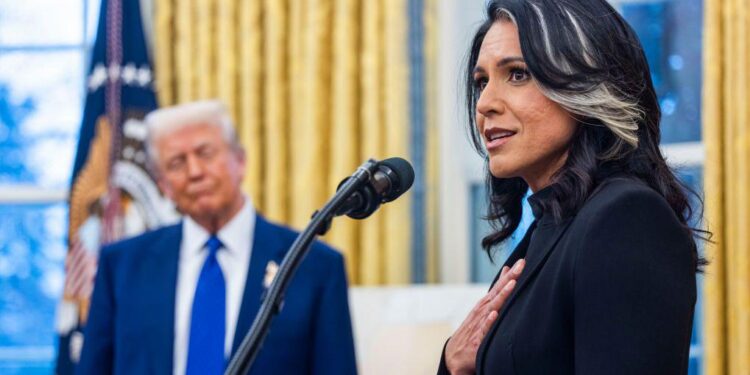Tulsi Gabbard claims Iran’s nuclear sites are “destroyed” and would take years to rebuild, while criticizing mainstream media for spreading propaganda and misinformation on the issue.

Tulsi Gabbard defended President Trump’s strike on Iran, stating that new intelligence shows Iran’s nuclear facilities were “destroyed” and would require years to reconstruct.
She also criticized the media for relying on leaked intelligence to undermine Trump and the military’s actions.
Tulsi Gabbard, the U.S. Director of National Intelligence, defended President Donald Trump’s actions regarding the U.S. strikes on Iranian nuclear sites. She cited newly obtained intelligence and accused the media of undermining the mission by selectively leaking information.
In a post on X (formerly Twitter), Gabbard supported Trump’s repeated assertions that U.S. military strikes had successfully “destroyed” Iran’s major nuclear facilities, despite persistent skepticism about the accuracy of those claims.
New intelligence confirms what @POTUS has stated numerous times: Iran’s nuclear facilities have been destroyed,
If the Iranians decide to rebuild, they would need to completely reconstruct all three facilities—Natanz, Fordow, and Esfahan—which would likely take several years,” she said.
Her remarks seem to directly address recent media reports referencing a preliminary assessment by the Defense Intelligence Agency (DIA), which suggested that the strikes may have only caused a temporary delay to Iran’s nuclear program.
Gabbard dismissed those stories, accusing media outlets of deliberately omitting key context in an effort to undermine Trump’s credibility.
“The propaganda media has deployed their usual tactic: selectively release portions of illegally leaked classified intelligence assessments (intentionally leaving out the fact that the assessment was written with ‘low confidence’) to try to undermine President Trump’s decisive leadership and the brave servicemen and women who flawlessly executed a truly historic mission to keep the American people safe and secure,” she said.
Gabbard’s comments follow Trump’s continued praise of the recent military operation, which he claims marked a pivotal moment leading to the current ceasefire between Israel and Iran. He has referred to the conflict as the end of what he calls the “12-day war.”
Although many in the U.S. intelligence community and foreign policy circles remain skeptical, Trump has maintained that the strikes were “obliterating” and helped restore what he described as “the credibility of American deterrence.”
Trump Blasts ‘Fake News’ Over Iran Strike Criticism, Warns of More Attacks if Tehran Rebuilds
During a press conference at the NATO summit in The Hague on Wednesday (June 25), President Donald Trump strongly defended recent U.S. airstrikes on Iran’s nuclear facilities. He condemned the “fake news media” for casting doubt on the effectiveness of the operation and issued a stern warning that any Iranian attempt to rebuild its nuclear program would be met with further military action.
Standing next to Defense Secretary Pete Hegseth, former President Trump read aloud from a letter he claimed was sent by Israel’s Atomic Energy Commission. The letter, he said, praised the U.S. operation and reinforced his administration’s position.
“We received a statement from the Atomic Energy Commission of Israel,” Trump announced. “These are very serious and credible individuals. The letter reads: ‘The devastating U.S. strike on Fordow destroyed the facility’s critical infrastructure and has rendered the enrichment site completely inoperable.’”
It was devastated. We assessed that the American strikes on Iran’s nuclear facilities had set back Iran’s ability to develop nuclear weapons for many years to come,” Trump continued reading. “This achievement can continue indefinitely if Iran does not get access to nuclear material.
Trump Criticizes Media Over Iran Nuclear Coverage
Former President Donald Trump lashed out at major U.S. media outlets, including CNN and The New York Times, accusing them of downplaying the impact of recent strikes on Iran by reporting that U.S. intelligence believes the attacks may have only delayed Iran’s nuclear program by a few months.
Table of Contents
Intelligence Report Questions Effectiveness of Trump Administration’s Iran Strike Claims
A preliminary U.S. intelligence assessment has found that the June 21 airstrikes on Iran’s nuclear facilities have only set back Tehran’s nuclear program by a few months—far less than the significant impact touted by President Donald Trump and senior administration officials.
According to a classified report by the Defense Intelligence Agency (DIA), the Pentagon’s main intelligence agency, Iran’s nuclear program may have experienced only a minor delay—estimated at just one to two months. The findings, initially reported by Reuters, were shared by three sources familiar with the assessment.
Operation Midnight Hammer
Over the weekend, the United States launched a coordinated military strike code-named Operation Midnight Hammer. The operation involved the deployment of 14 GBU-57 “bunker buster” bombs, delivered by B-2 stealth bombers, targeting heavily fortified nuclear sites in Fordow and Natanz. In parallel, more than two dozen Tomahawk cruise missiles were launched against facilities in Isfahan, with the objective of significantly degrading Iran’s nuclear enrichment capabilities.
U.S. defense officials stated that the mission aimed to dismantle Iran’s capacity to enrich uranium to weapons-grade levels. However, growing concerns have emerged that critical equipment and uranium stockpiles may have been relocated prior to the strikes, potentially reducing the operation’s effectiveness.”
READ ALSO……Mumbai private bus operators announce strike from July 1, school bus services also to be affected















 Categories
Categories









